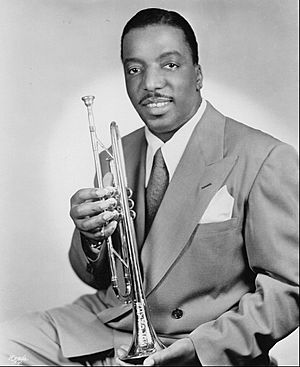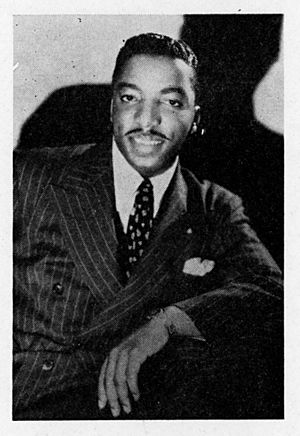Erskine Hawkins facts for kids
Quick facts for kids
Erskine Hawkins
|
|
|---|---|

Hawkins circa 1940s
|
|
| Background information | |
| Birth name | Erskine Ramsay Hawkins |
| Born | July 26, 1914 Birmingham, Alabama, U.S. |
| Died | November 11, 1993 (aged 79) Willingboro Township, New Jersey, U.S. |
| Genres | Jazz, blues |
| Occupation(s) | Musician, composer, bandleader |
| Instruments | Trumpet |
| Years active | 1930s–1980s |
| Labels | Vocalion, RCA |
Erskine Ramsay Hawkins (born July 26, 1914 – died November 11, 1993) was an American trumpet player and a famous big band leader. He was from Birmingham, Alabama. People sometimes called him "The 20th Century Gabriel" because he played the trumpet so well.
He is best known for writing the popular jazz song "Tuxedo Junction" in 1939. He wrote it with a saxophonist named Bill Johnson. This song became a huge hit during World War II. His band's version reached No. 7 on the national music charts. Another version by the Glenn Miller Orchestra even reached No. 1! Many talented singers performed with Erskine's orchestra, including Ida James, Delores Brown, and Della Reese. Erskine Hawkins was named after a well-known businessman from Alabama, Erskine Ramsay.
Contents
Erskine's Early Life and Music Training
Erskine Hawkins was named by his parents after a man named Erskine Ramsay. This man gave savings accounts to parents who named their children after him.
Erskine went to Councill Elementary School and Industrial High School in Birmingham, Alabama. This high school is now called Parker High School. At Industrial High School, he played in the school band. His band teacher was Fess Whatley. Mr. Whatley taught many African-American musicians who later worked with famous artists. Some of these artists included Duke Ellington, Louis Armstrong, and Lucky Millinder.
Leading a Famous Band
From 1936 to 1938, Erskine Hawkins recorded music for Vocalion Records. His band was called "Erskine Hawkins and his 'Bama State Collegians". In 1938, he signed a contract with RCA Victor. He then started recording on their Bluebird label. His band was simply known as "Erskine Hawkins and His Orchestra".
In the late 1930s, Erskine Hawkins and his Orchestra were one of the main bands at the Savoy Ballroom. This was a very famous dance hall. They often played on different nights than the Chick Webb band. They would often play "Tuxedo Junction" as their last song before the next band took the stage. This helped keep the dancing going without any breaks. Hawkins also had exciting "battles of the bands" with other famous leaders. These included Glenn Miller, Duke Ellington, and Lionel Hampton.
In the mid-1940s, his music was moved to the main RCA Victor label. He recorded many of his biggest hits for both labels during this time. He stayed with RCA Victor until 1950. Then he moved to Coral Records. He continued to record music for many more years.
Later Years and Legacy
From 1967 to 1993, Erskine Hawkins was a trumpet player and band leader. He performed in the lobby bar and nightclub at The Concord Resort Hotel in Kiamesha Lake, New York. His last band included Joe Vitale on piano, Dudly Watson on bass, Sonny Rossi on vocals and clarinet, and George Leary on drums.
Erskine Hawkins passed away at his home in Willingboro Township, New Jersey, in November 1993. He was 79 years old. He is buried in Elmwood Cemetery in Birmingham, Alabama, next to his sister.
Erskine's Personal Life
Flo Hawkins was Erskine's wife. She appeared in the 1946 movie That Man of Mine. They later separated, and she worked in the Catskill Mountains.
Awards and Recognition
In 1978, Erskine Hawkins received a great honor. He was one of the first five artists to be inducted into the Alabama Jazz Hall of Fame. This means he was recognized as one of the most important jazz musicians from Alabama. In 1989, he was also inducted into the Alabama Music Hall of Fame. Hawkins was a musical friend of another jazz musician from Birmingham, Sun Ra.
Popular Songs on the Charts
Erskine Hawkins had many songs that became popular hits. Here are some of his songs and how well they did on the music charts:
| Year | Single | Chart positions | ||||
|---|---|---|---|---|---|---|
| Pop | US R&B |
|||||
| 1936 | "Until the Real Thing Comes Along" | 20 | ||||
| "Big John's Special" | 18 | |||||
| 1937 | "Way Down Upon the Swanee River" | 17 | ||||
| 1939 | "Do You Wanna Jump, Chillun?" | 16 | ||||
| "Tuxedo Junction" | 7 | |||||
| 1940 | "Whispering Grass" | 13 | ||||
| "Dolemite" | 10 | |||||
| "Five O Clock Whistle" | 15 | |||||
| 1941 | "Song of the Wanderer" | 21 | ||||
| "Nona" | 17 | |||||
| 1942 | "Wrap Your Troubles in Dreams" | 23 | ||||
| "Bicycle Bounce" | 5 | |||||
| 1943 | "Don't Cry Baby" | 11 | 1 | |||
| 1944 | "Cherry" | 15 | 5 | |||
| 1945 | "Tippin' In" | 9 | 1 | |||
| "Caldonia" | 12 | 2 | ||||
| "Fifteen Years (And I'm Still Serving Time)" | 4 | |||||
| 1946 | "Sneakin' Out" | 5 | ||||
| "I've Got A Right to Cry" | 2 | |||||
| "After Hours" | 3 | |||||
| 1947 | "Hawk's Boogie" | 2 | ||||
| 1948 | "Gabriel's Heater" | 28 | ||||
| 1949 | "Corn Bread" | 8 | ||||
| 1950 | "Tennessee Waltz" | 6 | ||||
See also
 In Spanish: Erskine Hawkins para niños
In Spanish: Erskine Hawkins para niños
 | Selma Burke |
 | Pauline Powell Burns |
 | Frederick J. Brown |
 | Robert Blackburn |


